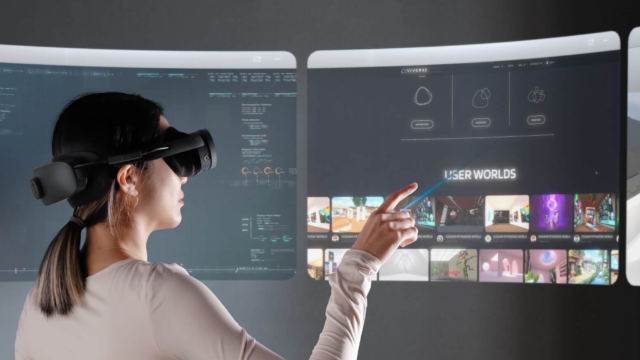Virtual reality (VR) is really cool – I really like it and the headsets required for it. VR headsets are fun to play with and it’s honestly a pretty good workout (I end up working up a sweat whenever I play my favourite sword game, Blade & Sorcery). But more and more, after years of hyped-up and unimpressive ‘metaverse’ applications for VR, the tech is now widely considered a hobbyist thing – like wheels and pedals for racing games. Despite this, HTC, one of the world leaders in VR tech, is still clinging to the dream of VR being an all-purpose technology like computers – and its VR boss wants AI to work into that dream.
Speaking with Gizmodo Australia while in the country for SXSW Sydney, it was clear to me that HTC’s China president and global vice president of corporate development Alvin Graylin is a VR fanatic. He said that he doesn’t necessarily play a lot of non-VR games, and has lately been playing Pistol Whip and Beatsaber, but is more interested in real-world applications for VR – stuff like training emergency responders in virtual scenarios.
Graylin said that there’s a big challenge with getting casual users to come back to VR. Hobbyists like me might use a headset for engaging and extremely immersive games like Half Life: Alyx and Pavlor VR, but what would keep people who wouldn’t consider themselves enthusiasts coming back? Well, Graylin thinks it’s AI.
“With AI-generated content, we can start making 3D models, we could start making 3D worlds, we can use AI as the backend support for 3DVR characters or NPCs that are in virtual worlds that brings everything to life, and it gives you a reason to go back,” Graylin said.
Graylin added that he expects VR game engines to soon allow for prompt-based inputs that’ll allow users to create a world completely autonomously. He described his desire for AI-generated worlds to be greater in numbers with a comparison to the internet – where there might be some thousand VR games, there are millions of places people can visit on the web. And with AI, Graylin expects VR to go from “two thousand development studios to essentially eight billion people”, with costs dropping from millions of dollars to “essentially zero”. I’m not sure what Graylin meant by “zero”, when HTC’s cheapest consumer-grade headset costs $2,099, and even a ‘cheap’ VR headset costs $800, and this is all before the costs of games and development tools.
“All they got to do is type in something and they’ve got a virtual world,” Graylin added.
On the one hand, it’s a utopian idea: Fresh new worlds ripe for exploring after typing some words into a prompt box. On the other, it’s utterly horrifying.
Prompt-based AI is largely dependent on the work created by actual human beings, which is essentially collected and stored in databases. These human-made works, after a prompt is entered by the user, are then synthesised into something new based on what has been previously created (because of this, AI has been rife with controversy).
To do this in VR would be interesting, sure, but in supporting AI, there is a risk of losing out on both developer creativity in VR and supporting developers to create unique worlds.
“I actually see it as the opposite,” Graylin said.
“The reason that people go there [to VR Chat, a popular VR app supported by HTC], is because of the community. They go there, they see their friends, they find people that are like them, they find commonality. Even if you don’t have a lot of programming experience, you can start to create worlds in there. With the help of AI, what will start to happen is that all these guys and ladies who are super creative will start to be able to use these tools to create even higher-quality content.”
Graylin expects that, for user-generated worlds such as in VR Chat, VR stands to enhance their ability to create. He thinks that we need to look at these things not as a replacement for creativity, but as an enhancement.
What shape AI will take in the world of VR remains to be seen. Major applications, such as VR Chat are still to adopt any AI features, though Meta’s Horizon Worlds is supposedly getting generative AI tools in the future.
At the moment, though, VR still involves strapping a computer to your head to access anything, with obstructive entry costs and limited use cases.
I, for one, just like playing my VR sword game.
Image: HTC
